Some things we do with books: Read them, obviously. Engage with them. Think about them, and all the different words for that: ponder, contemplate, consider. Tell people about them. Shelve them. Give them away. Check them out from the library. Buy them at a bookstore. Buy them online. Get into impassioned arguments about them.
What we don’t do? Consume them.
It is past time to push back on using this language of capitalism to talk about the experience of art. Words, as a colleague used to say with increasing frustration, mean things. And we have words that mean all kinds of things—words that have been replaced by and smashed into “consumer.” Moviegoer. Listener. Viewer. Audience, for crying out loud.
Reader.
Why is it so hard to call something what it is?
I have a lot of answers to that swirling about in my head, and one of them is simple: Publishing calls readers “consumers” because publishing is (mostly) a for-profit business in a capitalist world and what it cares about is that you buy books. When the industry refers to consumers, it makes it clear that what matters is not whether you read the books, but that you purchase them. That you exercise your almighty dollar in service to the books. After that? Eh, whatever.
(Yes, there are individuals—many of them! Many brilliant folks!—within publishing who care very much if you read the books. But I’m talking about the institutional scale. That did not stop me, in my last publishing job, from saying “readers” in response to my boss every time he talked about “consumers,” but that was my own tiny pushback, one I hope you might adopt.)
As much as I dislike this industry habit, I understand from whence it comes. What I don’t understand is why so many readers—and moviegoers and TV watchers and music fans and other people who love art in all its forms—are comfortable adopting it. “What are you going to consume this weekend?” is a question I have seen asked online, seemingly without irony.
My partner says that when he hears this phrasing, he thinks of the Nintendo character Kirby, inhaling everything in his path. Kirby spits some of those things out as weapons, internalizes other objects as skills or powers. It’s true that we experience art and it changes us. But we’re not Kirby. We take in art, intellectually and emotionally, and it still exists. The truth of art is that it is un-consumable. You cannot devour it like an apple, leaving only a core for whoever comes next. You can take it all in and it still persists. You can inhale a book, a show, a movie, and it remains there, ready for the next viewer or reader to breathe in. Consuming things makes them yours and no one else’s.
Art is never just yours to engage with. (With rare exceptions. Latte art. You can consume that.)
Words mean things. And if you think this is too picky, too particular, let me point you at another word that erases meaning: content. At one time, it seemed like “content” was going to be trapped on the internet, a word that meant things online. But now content is everything. Movies are content. TV shows are content. Ad copy is content. Promotional materials are content. If everything is content, it’s all the same, and can be devalued the same way (as we’re seeing with the corporate behavior that necessitated the current writers’ strike). Nothing is art. Nothing is film or literature or visual art or memoir or essay or whatever else it is you like to experience. It’s all just content. Grist for the mill.
Why has it become almost strange to call things what they are? An airline traveler is a passenger. A shopper is a customer. A lover of books is a reader. We are moviegoers, art fans, coffee fiends, tea drinkers, sushi lovers, fashion-obsessed; we are clients and visitors and people who need things like toothpaste and dish soap. We are only consumers because it is easier for capitalism to make us all the same. Little Kirby mouths, inhaling whatever we can.
In the just-published Monsters, a brilliant book I am not yet done with because I want to keep reading it, drawing it out over as much time as possible, Claire Dederer writes:
We now exist in a structure where we are defined, in the context of capital, by our status as consumers. This is the power that is afforded us. We respond—giddily—by making decisions about taste and asserting them. We become obsessed with this thing, mega-fans of that. We act like our preferences matter, because that is the job late capitalism has given us. And here’s the funny thing—our choices and preferences do matter, because something has to. Our selves are constructed from the shitty stuff of consumption, but we remain feeling people nonetheless.
I want her to push back on this, to resist it, in her nuanced and wise and clever and funny book about the art of monstrous men. I want her to say it doesn’t have to be like this. But it is like this, is the thing. That is the job late capitalism has given us. It wants us to pretend that “consumer” is a status, that what we consume is what we are. And so it’s made “consume” apply to everything, like materialism run ever more rampant. (Kirby, again, in my imagination, but with shopping bags and an iPhone.)
Depressingly, all of this has been building for ages. In a 1979 speech, then-President Jimmy Carter said:
Human identity is no longer defined by what one does, but by what one owns. But we’ve discovered that owning things and consuming things does not satisfy our longing for meaning. We’ve learned that piling up material goods cannot fill the emptiness of lives which have no confidence or purpose.
The president spoke against consumerism. And yet here we are, decades later, accepting “consumer” as a label where once a different word, a word that meant something more specific, once served.
In Monsters, Dederer does push back, repeatedly, against the times “we” is used to obfuscate, to hide behind. And in that spirit I want to be clear that when I say “we,” here, I mean us readers. I mean the people who come to a website on the internet to read about books—reviews, lists, Close Reads, essays, comparisons, thoughts, this column. If you are here, you care. You read. And so I am enclosing you gently in my “we” when I say: We don’t have to do this. We can read. We can watch. We can engage, if we must use a generic word.
What do you value? What do you want to raise up in this world, this big world in which we live brief lives? How do you want to shape things with language, within a life, with the way we interact with the world? What role does art play in your life? What role beauty? What do you want to set free rather than consume?
In 1998, in the preface to her book Ex Libris, Anne Fadiman wrote:
This model of readers as consumers—one I have abetted in many a book review myself—neatly omits what I consider the heart of reading: not whether we wish to purchase a new book but how we maintain our connections with our old books, the ones we have lived with for years, the ones whose textures and colors and smells have become as familiar to us as our children’s skins.
There’s another thing we do with books, with the stories that live both inside them and apart from them: We love them. (And sometimes we hate them.) We reread them, revisit them, stroke their covers when taking them off the shelves, lament not having enough time to read them, carry them from home to home, town to town, country to country, complaining about the weight and yet reluctant to leave a single one behind. Our libraries are our histories, not of things we’ve consumed, but people we’ve walked with for a day or a week or a month; stories we’ve internalized; stories that inspire or terrify or infuriate or devastate. We don’t consume them. We live them, in a very real way.
Language has power. Art can’t be consumed.
Molly Templeton lives and writes in Oregon, and spends as much time as possible in the woods. Sometimes she talks about books on Twitter.










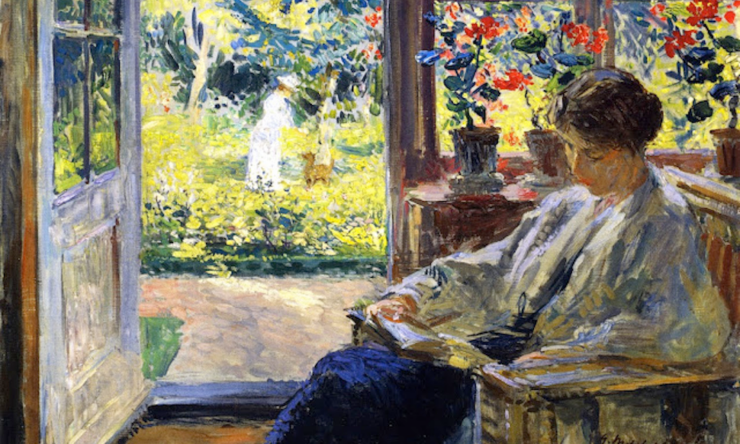
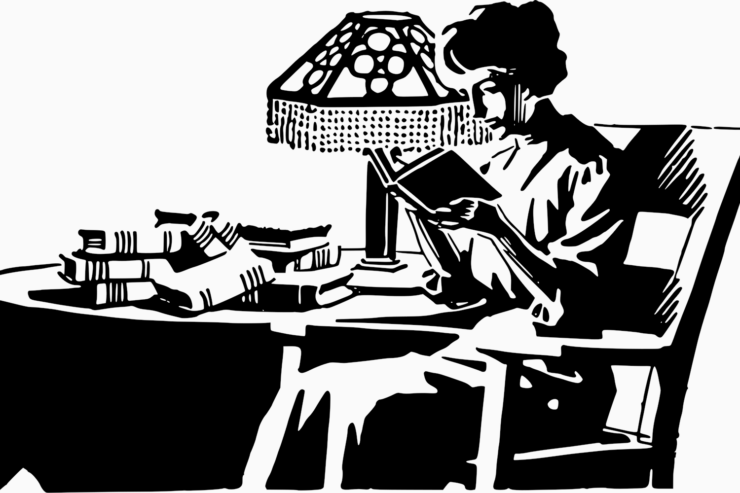
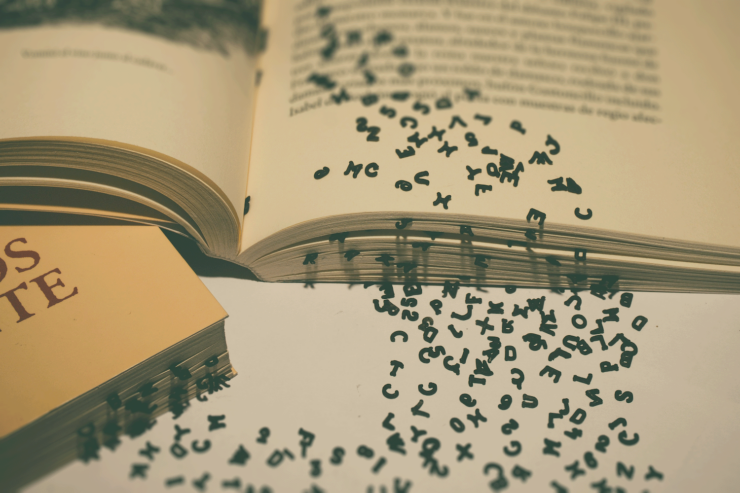
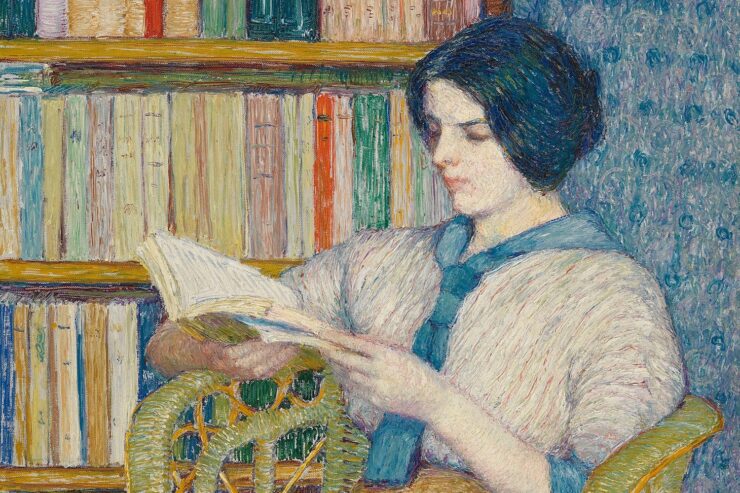
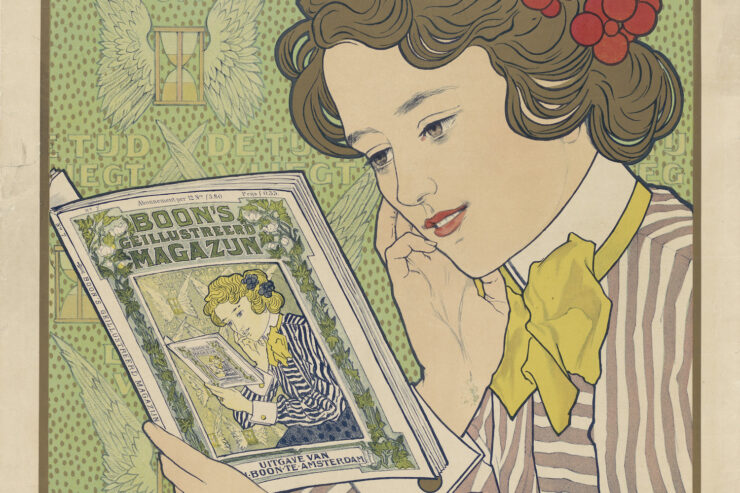
Yes, and I mostly agree. BUT I like the analogy to being able to completely devour something physically delicious, something that then nourishes us, something our discovery and enjoyment can lead to a recommendation to others. And don’t forget The Phantom Tollbooth, where words are definitely consumable!
“Consume” means to devour, and I devour my books. It has nothing to do with capitalism.
Very thought provoking, as always, and very moving. I am in a stage of sending my library back into the world, but I still carry those books and stories with me, and I look forward always to the new ones that have yet to come to me.
@2, exactly. Animals consume food to grow and sustain themselves, and would have whether humans, let alone capitalism, had ever evolved.
I purchase books, but they’re not truly mine–not part of me–precisely until, and to the degree, that I cosume, through reading, the information, beauty, or wisdom they contain.
This is a really interesting take. I totally hear the desire to push back on the idea that the act of consuming things defines us. But because we live in a society that emphasizes consuming as a solution to all problems (“feeling sad? eat/watch/read/drink/buy this!”), I think it’s necessary to use that language to understand how the things we consume impact us.
For me, thinking of reading (or watching movies, or anything else involving my eyeballs) as a form of consumption is helpful. Consuming to me means taking something in through any of the senses and processing them. And, like food, anything I’m taking in and processing will impact my thoughts, emotions, and sometimes physical health. (Ever read or watched something that made you feel physically sick? I have!) Thinking of reading as a form of consumption reminds me that there is a connection between the things I read and my well-being, and that I should adjust my reading “diet” accordingly. For example, reading the news and too many “hot-takes” online can really bring me down. Whereas reading thoughtfully written books can make me feel grounded and present.
I also want to push back on the idea that eating something makes it yours in a way that viewing art doesn’t. When we eat food, the matter we’ve processed (while certainly in a different form) eventually leaves us to be consumed by other organisms. So even consuming food doesn’t make it mine, it’s just something I’m processing that others will also process in some form or another after me.
Well-said, Molly – I have thought along these lines for a long time and am glad to hear someone express them more eloquently than I ever have.
The insinuation of biz-speak into our discourses should be resisted – words shape thought, and why should we allow MBAs to set our agendas?
I totally understand what you mean. Consuming something in the vein of capitalism is more in line with the thought that once something is purchased it begins to devalue. Consuming, reading, devouring a book is something that is unable to disappear or vanish like something we eat for sustainance. Although I’ve eaten meals so delicious that the memory of them sustained me for quite some time mentally and emotionally, if not physically. But you want the words to be more personalized, more succinctly tailored to the experience and less generic. I see where you are coming from and I agree whole-heartedly!
I’m with you, Molly! I was just thinking today about how much I detest the way “consumer” has replaced words like “citizen,” as if the only important thing about us collectively is what we buy. But I also appreciate hearing from others about how the word “consume” makes them think about how the things we read or watch or listen to can nourish us or fail to do so. I very much like the metaphor of books as food for our minds. For me, the word “consume” is too associated with business-speak to carry that connotation of nourishment. But I’ll try to remember that other people have other connotations associated with it, and then maybe it won’t bother me so much!
Thankyou Molly.
Happy to be included in your plural “we”.
I’m one of those ones who carted essential must have treasure books with me from country to country, coming back once with 40ks extra baggage, all books.
Now home I’ve happily unpacked all my old books and count as great pleasure simply looking at them on my bookshelves. And adding new ones, of course.
For those people who are naysayer, a quick dictionary definition of consume is to eat drink or digest. Notwithstanding the ecological arguments that good might be recycled into waste and garden fodder, the point is the food is gone, the process of consuming it makes it transform.
A book doesn’t. You’ve read it and it remains. Like you buy a couch for your living room. You don’t consume it, it remains there, for you to sit on, look at, enjoy. The couch and the book retain their form. They are not “consumed.”
Molly, I completely agree.
I am NOT a consumer of anything.
I eat food and enjoy what I eat. I buy and wear clothes, hats, vests, and fitted shirts – with French Cuffs!, and enjoy the feel and look of black denim jeans. I am an avid reader! I do, on occasion, ‘devour’ a book – but I savor them, I relish in them, I explore and get lost in them. But I do not take them as if I’m just some kind of garbage disposer or trash compactor. Those two devices consume things. I’m not even sure if animals consume their food, but that is a different discussion.
I watch TV, DVDs, and many streaming programs, among my many interests. I am a citizen and a voter. But the one thing I am not is a ‘consumer’.
I detest that word.
Lots of good points being made here, but I’ll point out that “consume” can be a handy catch all phrase. It’s an umbrella term that covers movies, television, video games, music, and books. It’s just kinda handy to ask a buddy “You consume any good media lately?” As opposed to asking “Watch any good movies? Play any good games? Ready a good book?” Only to have them say “Well, none of those, but there’s this album I’ve been obsessed with.” That sort of inclusivity means you don’t exclude an interest of theirs or commit a minor faux pas. It’s not a big deal, mind you, but it’s a minor convenience.
I had this very discussion with a would-be PhD advisor last year; she proposed the use of the term “imbibe” as an alternative, which of course, means basically the same thing, but has connotations of taste and discernment. It doesn’t get around the fundamental issue that the stories you read, watch, play, and listen to are still there after you’re done with them, but it at least makes it sound less mindless. I’ve tried to adopt if in daily usage.
Thought provoking and truth. Well said.
Not to shift the topic of conversation too much, but in academia there is a move to speak of students as customers. Definitely the same sort of shift and, again, one to be resisted.
One more like. From a stranger. For saying something I thought I knew, and proving it by reassuring me that you knew it too.
Having worked in public education for the last fifteen years as well as in retail after graduating high school 23 years ago, this shift to referring to people as consumers and customers in all forms of life is indicative of the use of statics to track our society’s activities and our childrens’ education. We are not people, we are numbers to be tracked and evaluated by businesses and government organizations that are a part of our daily lives. I want to go back to being a person and not a statistic that “consumes”.
Hell yeah, preach!
The producer-consumer mindset always comes at the expense of art (and other things). Art taps into novelty and zeitgeist, and thus creates new markets for Producers to serve. And then they Produce like hell. They saturate the market, and drive down the value of the art. Not just the monetary value, but also the novelty and originality of the art. Look at comic books, look at comic book movies, look at book to tv adaptations. Production continues until demand declines, and demand declines because Consumers become tired ofthe idea: it is no longer novel.
The shift from “citizen” or “American” or something specific to “consumer” happened in the 80s on mainstream evening news. Not politicians or experts, the anchors. It was a very noticeable shift and there was pushback then.
How about ‘inhale’ or ‘savor’? As readers we’ve all done both.
I could not agree more. I hate having all my interests gathered together under the “consumer” umbrella, especially because while yes, books feed my soul, I think there’s more to them (and reading them) than that. I think there’s the letters and tweets to the author, the conversations with friends, the rumination after you finish a particularly good bit. That’s not consuming, that seems more to me like tasting, sampling- words that indicate enjoyment, not vacuuming up everything into yourself like an indifferent void.
The books I read, the books I have read, they’re a part of me, and every move I lug them from place to place, and moan about it- but I love them, and I learned from them, and I am who I am because of them. The same isn’t true for every type of enjoyment, and when I stopped thinking about “consuming” books and meeting yearly book goals, I started having more fun, reading more, and getting more out of it. Who knew?
I love this pushback against the flattening of ourselves – and the things we do and interact with are very much what make up “ourselves”. Humans love to grab for a quick, easy way to describe big, complex things, but I don’t think relegating the vast array of our time with art and words and film into “content” that we “consume” has done anyone any favours.
Well, except the corporate overlords, and they are far less important to me than the creators (another quick, easy word for making big, complex things) of the things I love.
@13 I propose “get into” as a more friendly generic.
What we see is one more instance of a meaningful word becoming “commercialized” or unacceptable because of developments in society. In the English language, I am sure the idea of being a “consumer” of books, began as an effective metaphor. Unfortunately that effectiveness has run its course because of circumstances beyond its environment. So once more, we are searching for a new and vibrant application of language to satisfy our desire to say something original and unexpected.